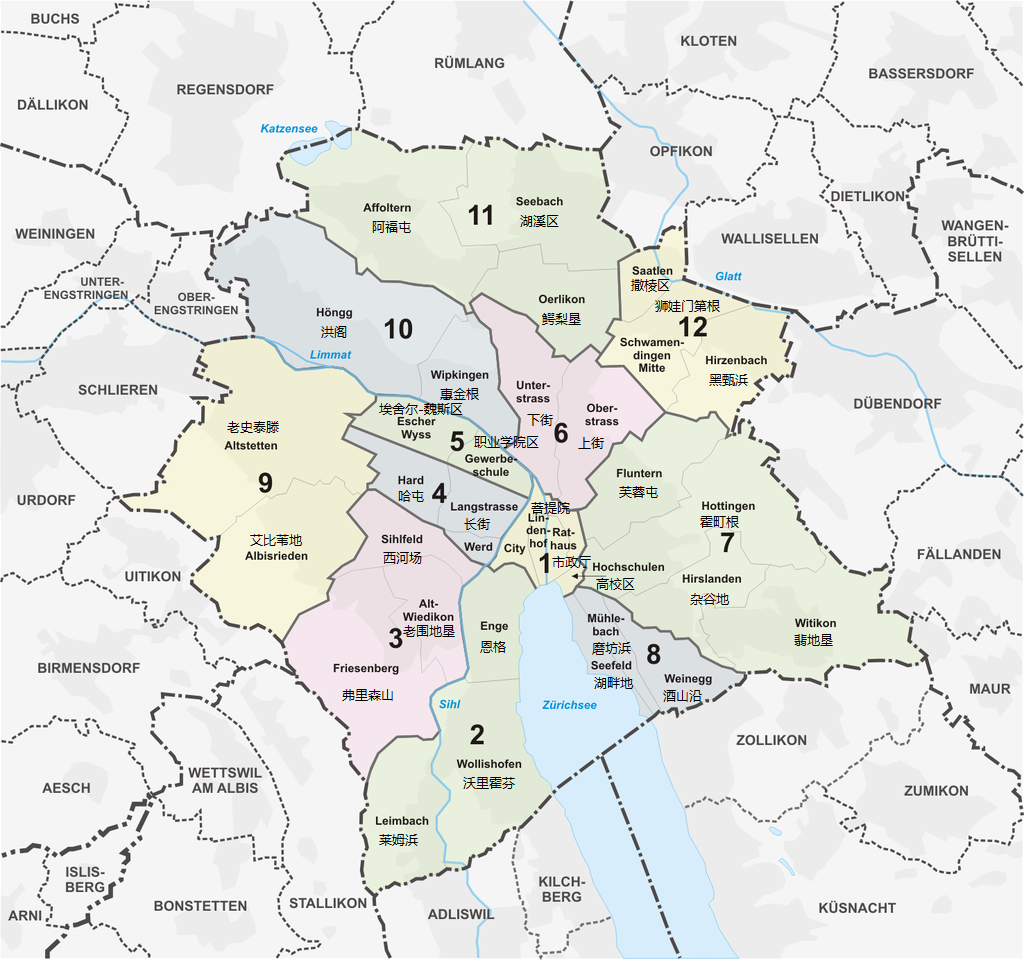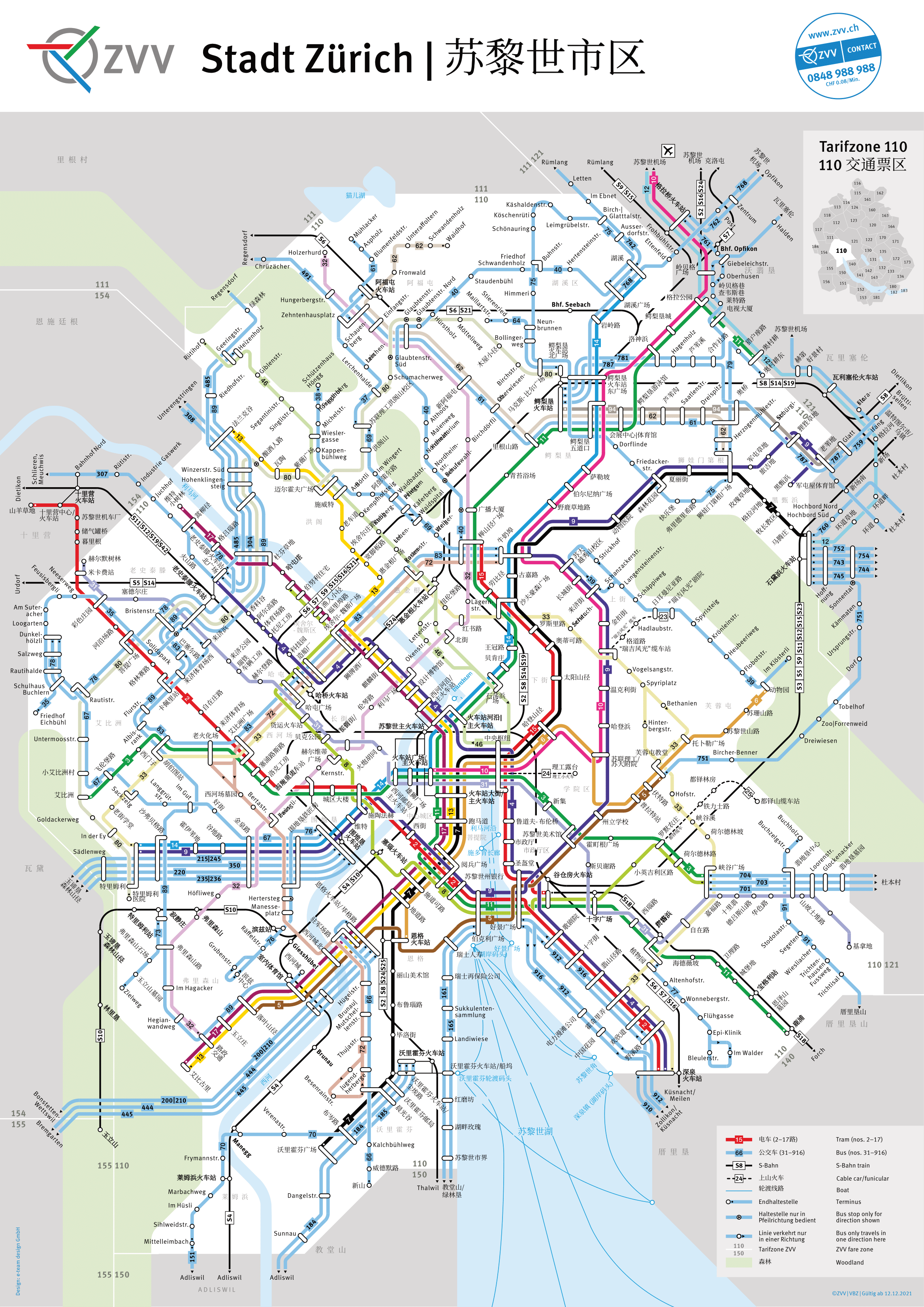Project ZHzh - a Chinese translation of Zürich public transportation map
It all started out as a simple question out of curiosity: what do these road names and tram stop names that I pass by every day in the trams mean? I have been asking myself this since my first year in Zürich, when I still took Tram 6 along the Limmat to school every day. Sure, some of the names are evident - “Löwenbräu” for “Lion Brewery”, “Bernoulli-Häuser” for “Bernoulli houses”, “Fischerweg” for “Fisherman path” - these are really just German words that can be easily translated. Others are more tricky. For instance, what is “quai” in “Bahnhofquai”? Where is the “turm” in “Hardturm”? [There is indeed a tower connected to a large parking lot at Hardturm, but I am almost certain that does not amount to the Turm] And are the Bernoulli-Häuser actually associated with the Basel Bernoulli family?
Thus began my side project of translating the map of city Zürich into Chinese. At first sight, it seems an easy-peasy work to do, but the mere number of tram stops, train stations and bus stops to be translated already signals a time-consuming task. It also doesn’t help that the etymology of these names are from several different sources. The Strassennamen-Datenbank der Stadt Zürich comprises perhaps the most comprehensive soure of street name origins, but falls short for non-street names and names with complicated history. In these circumstances, alt-zueri.ch is usually a good reference, in particular for special land names. In some cases, Wikipedia can also prove useful, for land names that originate in old German or other old tongue, well before the Medieval times. And in very rare cases, I find useful information only in some brochures on history compiled by local historians or librarians from the corresponding Quartiervereine.
Although the work is still ongoing, please allow me to present the Chinese translation of the neighbourhoods of city Zürich, as well as the translation of the 110-zone map of ZVV:


Download link for the full PDF version of ZVV 110-zone map:
As it turns out, not surprisingly, the land names and street names have several different types of origins. Many of these named are actual words conjugated together, which may indicate the previous landscape. “Albisrieden” indicates a wetland of reeds at the rim of Albis; “Werdhözli” is a small forest on Werd, an island in the middle of the Limmat river. Many others, though look like actual words, are named after families that once lived nearby, or after well-known persons. For instance, “Eschergutweg” is named after the Eschers’ nearby; and there is no Schaufel or any kind of Berg near “Schaufelbergerstrasse”, but just a person named Arnold Schaufelberger. Some of them are named after companies, present or historical, that are or once were the nuclei of the neighbourhoods. These include the “Siemens” station in the southwest, apparently named after the company Siemens, and “Schweizer Rück”, named after the reinsurance company SwissRe.
For the most translation work, I try to precise so that the original meaning of the language is preserved. But at some point, I have to stop. There is some vague explanation on Wikipedia, saying “Werd” itself may be an old word for river island; or “Letzi” may be an old Swiss word for defense works. These words have no correspondance in Chinese (or English) that is both accurate and “local” enough. And the same thing happens in Chinese - and I bet, all other languages - although some words or characters carry their own meanings, the meanings are lost over the centries when these words are used in region names. There is etymology to almost every name of village and town, but quite often people no longer recall their original meanings in the modern context. Eventually, I have to stop somewhere, and do the transliteration.
Of course, sometimes I play with the not-so-strict translation, simply to make the translated name more Chinese, more culturally close, and more interesting to read. Oerlikon has nothing to do with avacado, except for the fact that they pronounce similarly in Chinese; the same thing holds for Milchbuck, Fluntern, etc. For completeness, I intend to list the etymology details of the entries below. But please let me have the fun part also ;)